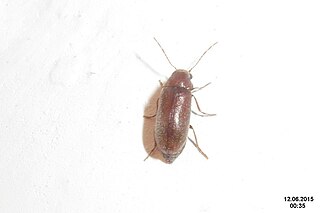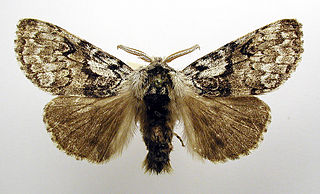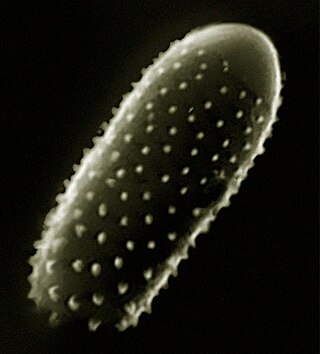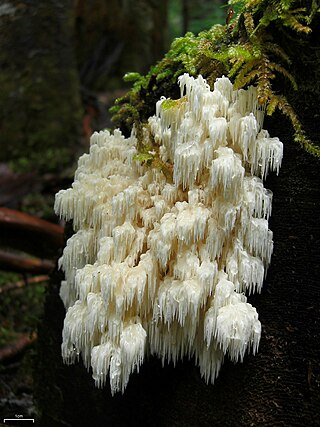
Hylobius abietis or the large pine weevil is a beetle belonging to family Curculionidae. This species is widely regarded as the most important pest of most commercially important coniferous trees in European plantations. Seedlings planted or arising from natural regeneration after clear felling operations are especially at risk. The adult weevils cause damage by eating the bark of seedlings around the 'collar' of the stem, thus 'ring-barking' the tree seedling which usually results in its demise.

Ernobius abietis is a species of beetle in the family Ptinidae.

Calliteara abietis is a moth of the family Erebidae. It is found from northern and central Europe, through Russia to Japan.

Melampsora is a genus of Basidiomycota fungi. Melampsora species are plant pathogens.

Hericium abietis, commonly known as the bear's head or the western coral hedgehog, is an edible mushroom in the tooth fungus group. It grows on conifer stumps or logs in North America, producing a cream white fruit body up to 10–75 cm (4–30 in) tall and wide. It fruits from after the start of the fall rains to mid-season.

The pineapple gall adelgid is a species of conifer-feeding insect that forms pineapple-shaped plant galls on its host species, commonly Norway and Sitka spruce. The adelgids are pear-shaped, soft-bodied green insects with long antennae, closely related to the aphid. Adelges lays up to one hundred eggs at a time, one on each needle. Adelges abietis is one of the most common species; synonyms are A. gallarum-abietis, Chermes abietis and Sacciphantes abietis.
Chrysomyxa abietis, or spruce needle rust, is a species of rust fungi in the Coleosporiaceae family that is native to eastern Europe and northern Asia. It was introduced to Australia, New Zealand and the United States.

Neodiprion abietis, commonly known as the balsam fir sawfly, is a species of insect in the family Diprionidae. It is found in North America from Canada to northern Mexico and is phytophagous, feeding on the needles of coniferous trees.

Pogonocherini is a tribe of longhorn beetles of the subfamily Lamiinae.
Poliaenus is a genus of longhorn beetles of the subfamily Lamiinae, containing the following species:
Poliaenus batesi is a species of beetle in the family Cerambycidae. It was described by Linsley in 1933. It is known from Guatemala.
Poliaenus californicus is a species of beetle in the family Cerambycidae. It was described by Schaeffer in 1908. It is known from the United States.
Poliaenus hesperus is a species of beetle in the family Cerambycidae. It was described by Chemsak and Linsley in 1988. It is known from Mexico.
Poliaenus negundo is a species of beetle in the family Cerambycidae. It was described by Schaeffer in 1905. It is known from Mexico and the United States.
Poliaenus nuevoleonis is a species of beetle in the family Cerambycidae. It was described by Chemsak and Linsley in 1975.
Poliaenus obscurus is a species of beetle in the family Cerambycidae. It was described by Fall in 1910.
Poliaenus oregonus is a species of beetle in the family Cerambycidae. It was described by John Lawrence LeConte in 1861. It is known from North America.
Poliaenus volitans is a species of beetle in the family Cerambycidae. It was described by John Lawrence LeConte in 1873. It is known from Guatemala and Mexico.

Helminthosporium is a genus of fungi belonging to the family Massarinaceae.
Delphinella abietis is a species of fungus in the family Dothioraceae. It has been reported from western Norway where it infects needles and sometimes shoots of various fir species. These include subalpine fir, Nordmann fir including Turkish fir, Siberian fir and noble fir.








